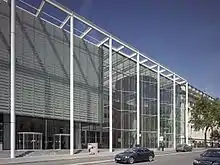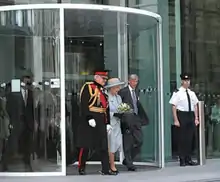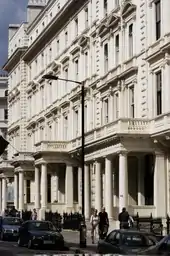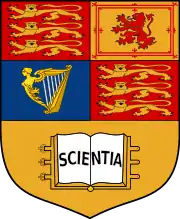Imperial College Business School
Imperial College Business School is the business school of Imperial College London. The business school was opened by Queen Elizabeth II in 2004.[1] Over 90 percent of the faculty are from outside of the United Kingdom, with alumni in 124 countries.[under discussion][2]
 | |
| Motto | Imperial means Intelligent Business |
|---|---|
| Type | Public business school |
| Established | 2004 (course dates to 1955) |
| Dean | Francisco Veloso |
| Location | London , United Kingdom |
| Affiliations | Association of MBAs EQUIS AACSB |
| Website | imperial.ac.uk/business-school |
History

The business school can trace its earliest origins to 1955, when the Operational Research/Management Science (ORMS) course started at Imperial in the Production Engineering Section of the Mechanical Engineering Department.[3] There were only 5 students enrolled when the programme commenced in October 1955 at 14 Prince's Gardens, with an arrangement in place for students to be able to attend one-day intensive economics and accounting courses for one or two terms at the London School of Economics.[3] The agreement became a reciprocal one lasting until 1966. In the mid-1960s, there was even the idea of creating a joint School of Administration, Economics and Technology (between Imperial and LSE) but this was ultimately rejected in favour of a new graduate school of business being started in the capital.[4] Imperial and LSE acted as co-sponsors in the establishment of this new school, named the London Graduate School of Business Studies and now known as the London Business School.[3] Accordingly, the London Business School's first academic planning board included the heads of Imperial College and LSE.[5]
From the ORMS course, a Department of Management Science (DMS) was established at Imperial in 1971, under the leadership of Samuel Eilon.[6] The department was composed of staff and students from Imperial's Industrial Sociology Unit and at its inception had 15 academic staff and around 60 students on an MSc course.[6] Over subsequent years the department grew and its focus shifted towards business studies.[6]

In 1987 the Department of Management Science was merged with Imperial's Department of Social and Economic Studies to form a new School of Management, based in 2 large Victorian houses on Exhibition Road.[7] David Norbun was the first Director.[7] The School launched a new three-year part-time Executive MBA course.[8]
Business school
In 2000 Gary A. Tanaka, an alumnus of Imperial, agreed to make a substantial donation to the college.[8] It was decided to utilise the donation, together with other resources, to fund the transformation of the School of Management into a research-led business school.[8] Tanaka ultimately donated a total of £27 million to Imperial, of which £25 million went to the new business school, in what was at the time the largest single donation to any European business school.[9][10] The new Tanaka Business School was launched in 2003, with David Begg as Director.[8]
In August 2008 the school was renamed Imperial College Business School because the old name did not strongly emphasise its association with the College. The school's accommodation was subsequently named "the Tanaka Building".[11] An alternative speculation is that the college changed the name of the school to distance itself from Tanaka's fraudulent activities[12] after he was tried and found guilty of conspiracy, securities fraud and investment adviser fraud in the same year.
In March 2013 the British hedge fund manager and Imperial alumnus Alan Howard donated £20.1 million to fund the establishment of a finance research centre, the Brevan Howard Centre for Financial Analysis.[13]
Campus

The business school is located on Exhibition Road at Imperial's South Kensington campus.[14] This was built on the site of the Goldsmith's wing of the Royal School of Mines, incorporating the 19th century vaults of the older building. The new building was designed by Foster and Partners with engineering consultancy from Buro Happold. It was constructed between September 2002 and June 2004 at a cost of £15.7 million, and was opened in 2004 by Queen Elizabeth II. It has 639 seats in seven lecture theatres and desk space for 70 PhD students.[1][15] The building was renamed the Tanaka Building in August 2008.[11] The business school also operates out of a secondary building, 53 Prince's Gate, also in South Kensington. From the 2020–2021 Academic year, some teaching and research will operate from Imperial's White City campus.[14]
Taught programmes
Postgraduate
Imperial College Business School offers the following postgraduate programmes: MBA (Imperial MBA, Imperial Executive MBA & Weekend MBA, Global MBA (online), Master's programmes, Joint Master's programmes, and a Doctoral programme.
Undergraduate
The school offers joint honours undergraduate degrees in collaboration with Imperial College's departments of Biochemistry, Biology, Biomedicine and Chemistry, and an intercalated BSc in the third or fourth year of medical degrees for medical students at Imperial College and other medical schools. Both of these involve spending a year in the Business School. The Business School also offers modules to students from other departments at Imperial College via the Business for Professionals of Engineering and Science programme.[16]
Research and doctoral programme
In the 2014 Research Excellence Framework (REF), Imperial's business school had the highest proportion of ‘world-leading’ (4*) and ‘internationally excellent’ (3*) research in the UK (92%), ahead of the London School of Economics at 89%.[17][18]
Doctoral students joining the business school's 5-year PhD in management programme assimilate into one of the following three research groups:
- Management Group – examines many of the core management disciplines such as economics, health management, marketing, operations management, and strategy and organisational behaviour. The Group's work is complemented by the two specialist groups (below).
- Finance Group – active in finance research. The group has particular interests in investments and asset pricing, corporate finance, finance and risk management and financial analysis.
- Innovation and Entrepreneurship Group – focuses on how innovation occurs, how new products and processes are developed and how new ideas transfer from the lab to the organisation and how new products are adopted by consumers.
Admission
Entrance to the PhD programme for new doctoral researchers at the business school is around 5% each year, with an annual intake of around 15 students.[19]
Doctoral theses
Since 2008, 100 candidates have successfully completed their doctoral degrees at the business school via the submission and acceptance of a research thesis.[20] These are held in physical form at Imperial's central library and can also be accessed electronically using the university's online repository, Spiral.
Executive education
The Business School offers Executive Education programmes in Technology, Innovation, Leadership, Marketing, Health and Finance. Programmes are split into short programmes[21] for individuals, custom programmes[22] for companies, and online programmes.[23]
Rankings

Imperial College Business School is ranked 19th in the QS Global MBA ranking 2020,[24] 55 in the Financial Times Global MBA ranking 2020,[25] and is not included in The Economist's 2019 ranking of the top 100 full time MBAs globally;[26] it is also ranked 13 among European business schools in 2019–20 by Bloomberg Businessweek.[27]
In the QS Global MBA rankings by specialisation, Imperial is ranked 2nd for MBA's specialising in entrepreneurship,[28] 20th for specialisation in consulting,[29] 28th for specialisation in finance,[30] 22nd for information management,[31] 24th for specialisation in marketing,[32] 14th for specialisation in operations management[33] and 22nd for specialisation in technology.[34] It was also ranked 5th for its master's degrees in management[35] and in business analytics.[36]
For the topic of entrepreneurship, it has ranked 1st in Europe within Bloomberg, Financial Times, QS Global MBA Rankings, and Reuters -The World's Most Innovative Universities.[37][38][39][40]
People
Directors and deans
- Sam Eilon (1955–1987)
- David Norbun (1987–2003)
- David Begg (2003–2012)
- Dorothy Griffiths (2012–2013)
- G. "Anand" Anandalingam (2013–June 2016)
- Nelson Phillips (July 2016–July 2017)
- Francisco Veloso (August 2017 – present)
Academic staff
- Franklin Allen, Associate Dean Research and Faculty, Executive Director of the Brevan Howard Centre (2014–present)
- David Gann, Vice President Development and Innovation
- Carol Propper, CBE, FBA, Chair in Economics
- William Perraudin, economist (former Chair in Finance, now Adjunct Professor)
- David Miles, CBE, Professor of Financial Economics
- George Yip, Professor of Marketing and Strategy
- Tommaso Valletti, Chair in Economics, Chief Competition Economist of the European Commission (2016–2019)
- Nelson Phillipps, Abu Dhabi Chamber Professor in Innovation and Strategy
- Maurizio Zollo, Head of Department of Management & Entrepreneurship, Professor of Strategy & Sustainability, Scientific Director of the Leonardo Centre
- Paola Criscuolo, Professor of Innovation Management
References
- 21st Century Learning Environments. OECD Publishing. 2006. p. 100. ISBN 9789264006508.
- "Global Initiatives". Imperial College Business School. Retrieved 2019-12-19.
- "A History of Management Science at Imperial College (1955-1989)" (PDF). Pubsonline.informs.org. Retrieved 2016-07-30.
- "History of the Department - About us - Department of Management - Home". Lse.ac.uk. 2016-05-09. Retrieved 2016-07-30.
- Allan P. O. Williams (6 September 2010). The History of UK Business and Management Education. p. 16. ISBN 9781849507806. Retrieved 2016-07-30.
- Gay, Hannah (2007). The History of Imperial College London, 1907-2007: Higher Education and Research in Science, Technology and Medicine. World Scientific. p. 578. ISBN 9781860947094.
-
- Gay, p 579
- Gay, p 580
- Beckett, Francis (18 May 2004). "Degrees of gratitude". The Guardian. London. Retrieved 30 June 2012.
- "Former student donates £27m". BBC News. 26 October 2000. Retrieved 30 June 2012.
- "Imperial College London - Business school changes name". Times Higher Education. 28 August 2008. Retrieved 1 July 2012.
- "Archived copy". Archived from the original on 2009-07-27. Retrieved 2009-07-28.CS1 maint: archived copy as title (link)
- Werdigier, Julia (11 March 2013). "Hedge Fund Donates $30 Million to Imperial College". The New York Times. Retrieved 17 March 2013.
- "Location". Imperial College Business School. Retrieved 10 April 2020.
- "Archived copy". Archived from the original on 2010-08-24. Retrieved 2010-09-12.CS1 maint: archived copy as title (link)
- "Undergraduate study". Imperial College Business School. Retrieved 6 October 2020.
- "Subscribe to read". Financial Times. Cite uses generic title (help)
- "Business School performs well in REF 2014 | Imperial College Business School". Imperial.ac.uk. 2014-12-18. Retrieved 2016-07-30.
- "How many students do you accept onto the Doctoral programme every year? | Imperial College Business School". Imperial.ac.uk. 2015-10-27. Retrieved 2016-07-30.
- https://spiral.imperial.ac.uk:8443/handle/10044/1/4262
- "Executive Education". imperial.ac.uk. Retrieved 5 March 2020.
- "Executive Education". imperial.ac.uk. Retrieved 5 March 2020.
- "Executive Education". imperial.ac.uk. Retrieved 5 March 2020.
- "QS Global MBA ranking 2020". QS Quacquarelli Symonds. Retrieved 10 April 2020.
- "Global MBA Ranking 2020". Financial Times. Retrieved 10 April 2020.
- "Full time MBA ranking". The Economist. Retrieved 10 April 2020.
- "European B-Schools Ranking". Bloomberg Businessweek. Retrieved 10 April 2020.
- "MBA by Specialization 2019 Entrepreneurship". TopMBA.com. 2019-03-15. Retrieved 2019-04-24.
- "MBA by Specialization 2019 Consulting". QS Quacquarelli Symonds. Retrieved 10 April 2020.
- "MBA by Specialization 2019 Finance". QS Quacquarelli Symonds. Retrieved 10 April 2020.
- "MBA by Specialization 2019 Information Management". QS Quacquarelli Symonds. Retrieved 10 April 2020.
- "MBA by Specialization 2019 Marketing". QS Quacquarelli Symonds. Retrieved 10 April 2020.
- "MBA by Specialization 2019 Operations Management". QS Quacquarelli Symonds. Retrieved 10 April 2020.
- "MBA by Specialization 2019 Technology". QS Quacquarelli Symonds. Retrieved 10 April 2020.
- "World University Rankings - Masters In Management 2019". TopMBA.com. 2018-09-19. Retrieved 2019-04-24.
- "World University Rankings - Masters In Business Analytics 2019". Top Universities. 2018-09-19. Retrieved 2018-10-02.
- "Reuters". The World's Most Innovative Universities.
- "Bloomberg: MBA Top Schools for Entrepreneurship". Bloomberg.com. 2019-09-10. Retrieved 2019-09-10.
- "Financial Times" (PDF). Top 10 MBA's in Select Categories.
- ""Imperial Ranked #1 for Entrepreneurship - Executive MBA" (PDF). Financial Times" (PDF).
External links
- Official site
- Imperial College Business School History and architecture of the school building
